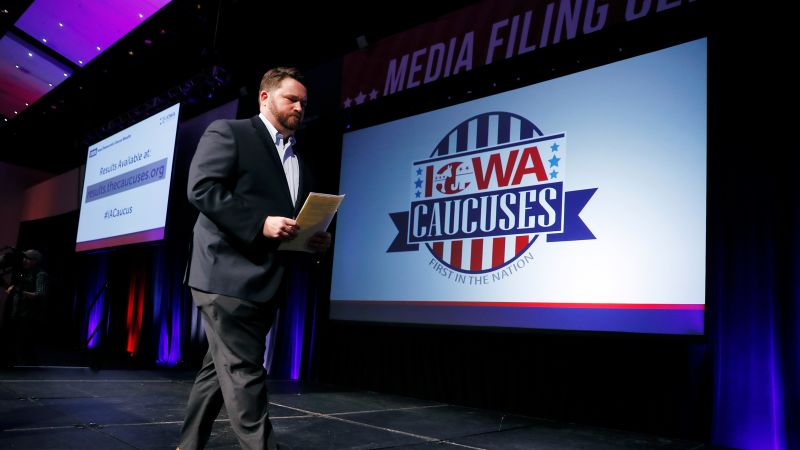In the bustling landscape of U.S. politics, the importance of primary elections cannot be overstated, especially as the 2024 presidential primaries loom on the horizon. A key player in this process has been Iowa, a state that has historically held significant influence within the Democratic National Committee (DNC). However, as the 2024 primaries draw near, Iowa Democrats find themselves in a precarious position, fighting valiantly to retain their status as an early nominating state.
Historically, Iowa has set the tone for presidential campaigns by being the first in line with its caucus system. Yet, after the chaotic rollout of a Results Reporting app during the 2020 caucuses— which hampered the timely announcement of results— the Iowa Democratic Party transitioned to a vote-by-mail primary format. This change, designed to modernize and secure the caucus process, was part of a last-ditch effort to keep Iowa in the spotlight amidst a landscape of other states gunning for early nomination status.
Despite the changes and efforts of Iowa Democrats, the DNC, at the behest of prominent figures including former President Joe Biden, has shifted its focus to South Carolina as the leading primary state. This decision has not only stripped Iowa of its first-in-the-nation status but has also prompted concerns among Iowans that the shift may enable Republican narratives asserting that Democrats have abandoned the state. The state’s diminished role within the DNC is evident, especially after it lost representation on the influential rules and bylaws committee, while rival states like Nevada, New Hampshire, and South Carolina secured additional seats.
Going forward, Iowa will need to compete vigorously against a slate of other states as the Democratic Party prepares to refine its 2028 primary calendar. This will undoubtedly shape the strategies employed by presidential campaigns and ultimately determine the candidates who gain momentum. There are poignant historical reminders that the Iowa caucuses have historically served as launchpads for prominent figures like Jimmy Carter and Barack Obama. Nevertheless, the Republicans have signaled that they will maintain their commitment to Iowa, keeping it as a launch point for their own primaries.
Critics of the caucus format argue for a system that better reflects the nation’s diversity, positing that early primary states should resonate more closely with the essential swing states vital for Democrats’ success in the general election. Even among the Democrats who wish Iowa to continue having an early say in the process, there is a growing consensus that a transition away from the caucus model is necessary, as it is critiqued for its lack of accessibility compared to traditional primary elections. The traditional caucus system requires voters to gather together in public spaces and engage in extensive discussions, which can result in lengthy delays and inconsistent participation rates.
Democratic strategist sentiments reflect a balance of nostalgia for the Iowa caucuses against the recognition of the need for reform. “A generation of us have a lot of romanticism about the Iowa caucuses,” expressed a strategist who has been deeply involved in Iowa political campaigns. Yet he acknowledged the importance of fairness in the electoral process, underscoring that a system which necessitates lengthy in-person attendance may not be equitable.
The DNC, led by officials like Chairman Ken Martin, emphasizes a commitment to transparency and fairness in determining the early primary states. They have assured that there will be an open process for all states wishing to be included in the early lineup. Hart, the Iowa Democratic Party chair, recognizes the challenges ahead, especially as Democrats gear up for important contests in 2026, including a pivotal gubernatorial seat and crucial congressional elections.
Yet, despite the uncertainty surrounding Iowa’s future in the primary calendar, potential candidates for the 2028 Democratic presidential nomination are beginning to engage with Iowans, participating in town halls and traditional events to maintain visibility. Political figures such as Pete Buttigieg and Senator Ruben Gallego are set to make appearances at significant venues, including the Iowa State Fair, signaling that Iowa still holds symbolic importance in the presidential campaign landscape.
The debate within Iowa’s Democratic circles over whether to aggressively push for early-state status or to navigate future contests separately from the DNC is ongoing. Strategists like Pete D’Alessandro suggest that Iowa Democrats should establish their own timeline irrespective of potential consequences laid out by the DNC, betting on the historical importance of Iowa that candidates will continue to value as the political landscape unfolds.
In light of such discussions and planning, it will be interesting to see how the interplay of tradition, reform, and electoral strategy plays out in the upcoming primaries. The evolving narrative surrounding Iowa highlights broader tensions within the party, as it grapples with the complexities of identity and representation in a changing political climate.











